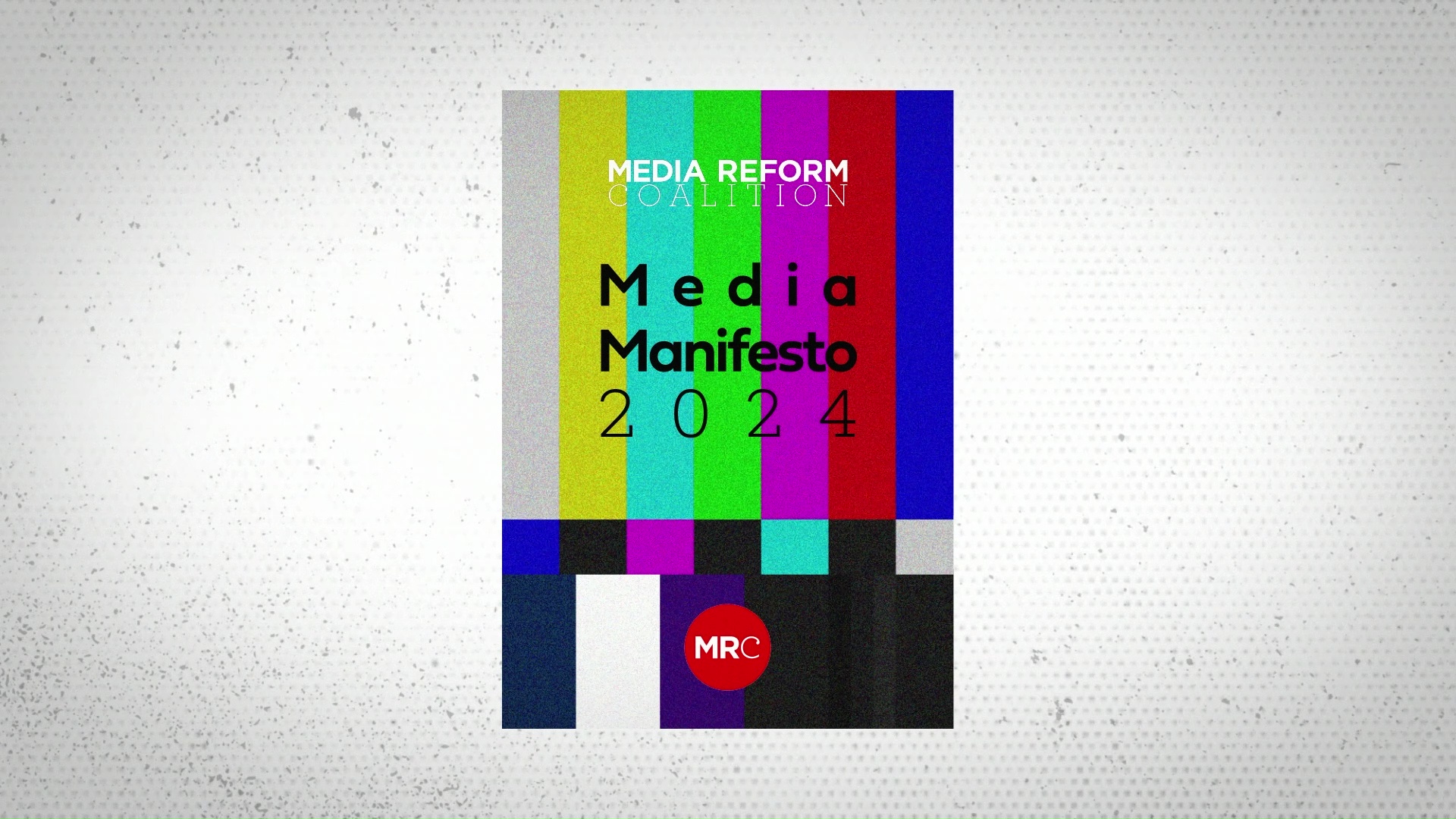Our media are failing democracy.
A healthy democracy depends on a free and independent media. Yet the UK’s media system has systematically failed in its key purposes: to hold power to account, to fully represent all parts of our society and to offer a trusted space for public discussion and creative expression.
Our Media Manifesto 2024 details five priorities for reclaiming media’s place at the heart of our democracy; breaking with the failures of the past, building a media commons that serves the public interest, and ensuring that our media thrives in the future.
Successive governments have ignored the widespread abuses of power that epitomise our broken media. If the new government seeks to deliver any kind of progressive social change, it cannot afford to ignore the overwhelming case for radical media reform.
The UK’s unique model of public service broadcasting has been undermined by decades of political interference, commercialisation and debilitating funding cuts. We need radical reforms to transform the old model of public service broadcasting into a progressive system of public service media, based on universal provision, political independence and democratic public control over funding, governance and regulation.
The UK media is suffering a severe crisis of concentrated media ownership. Our national newspapers, local media and online platforms are dominated by a handful of billionaire media moguls and unaccountable Big Tech companies. Current regulations have utterly failed to tackle the systemic abuses of media power that are destroying our democracy. We need new, future-proof frameworks for protecting media plurality and upholding the highest standards in journalism.
The internet is essential to modern life, but our digital freedoms and shared online spaces are constrained by a few Big Tech companies. Creating a British Digital Corporation, with a mission to develop public internet infrastructure and new democratically-operated digital platforms, would provide provide a non-commercial public interest alternative to counterbalance to the power of Big Tech.
Across our local newspapers, radio and television stations, the UK’s local media are in a perilous state. Revitalising our local media is not just about finding new funding models, but also means embracing new ways of supporting public interest journalism and democratising local media ownership. The failure of the existing market-based model to sustain an independent, rigorous and plural local press shows that we need a new deal for local media.
Tackling the issues we have now should not be the end of our public conversation about media’s place and purpose in British society, culture and democracy. The next government should establish a Public Commission on Media and Democracy, to conduct a comprehensive investigation into the relationship between the media, the public and British democracy, covering a range of topics from intricate challenges of regulation to deeper debates about media’s role in facilitating cultural self-expression, social cohesion and democratic citizenship.
Principles of media reform
While the proposals in our Media Manifesto 2024 all address different parts of the media landscape or specific kinds of structural failures, every reform is grounded in four essential principles:
- Independence
- Our media must be genuinely independent, able to scrutinise the actions of the powerful and operate without fear or favour. Media institutions must be free from external controls by state or political actors, as well as free from commercial or proprietorial capture by private media owners.
- Accountability
- Our media must be held to high ethical and professional standards through effective, independent and trustworthy systems of accountability. Accountability is not defined just by laws and regulations, but is also practiced through more collaborative and transparent relationships between media outlets, media workers (and their unions) and the public.
- Democratic control
- Our media cannot fully support a democratic society unless media institutions themselves are organised democratically and conceived as public goods. This required new models of public ownership, public funding and direct public participation in media governance.
- Universality
- Our media must work for everybody. From broadcasters and national newspapers to online platforms and community outlets, the media system as a whole must serve the needs and desires of all. Our media must also be accessible to everyone regardless of their wealth, identity or locale.
1. A more democratic, diverse and independent public service media
The BBC’s role as a universal, independent and publicly-funded national broadcaster has been undermined by pervasive political interference, debilitating funding cuts, commercialisation and market based regulation. The UK’s wider public service broadcasting ecology has also been weakened by commercialisation and deregulation, ineffective oversight and a total absence of democratic decision-making.
Over the last four decades, the core ideals and values of public service broadcasting have been steadily eroded. We need radical reforms to transform the old models of public service broadcasting into a progressive system of public service media.
These reforms would empower our valued broadcasting institutions to adapt to the emerging media landscape, enshrining universal provision as a public good and creating new democratic mechanisms for funding, regulating and governing our public media:
- Establish an independent Public Media Monitor with statutory duties for regulating all PSBs in the public interest, supporting the public provision of a wide range of genres and formats, and devolving key decisions about public media to participatory audience councils in the nations and regions.
- Abolish the government’s control over appointments to the BBC, and in its place establish an independent appointments process with the BBC Board directly elected by its audiences.
- Replace the BBC’s Royal Charter with a statutory constitution built on a regulatory framework that prioritises the needs of the public rather than commercial interests.
- Reform the TV licence fee as a universal household levy collected through council tax, with the new Public Media Monitor responsible for setting the value of the levy. The independent Monitor would be tasked with evaluating the financial needs of the BBC to fulfil its public service obligations, determining a secure long-term funding settlement, and providing concessionary rates for households with relevant exemptions.
2. Ending the abuses and concentrations of media power
Current regulations have utterly failed to tackle the systemic abuses of media power that are destroying our democracy. Our press is dominated by a handful of news outlets that reflect only a tiny portion of this country’s political spectrum. This lack of diversity has amplified the spread of misinformation, extremism and hate, as evidenced by the rise of new ‘anti-establishment’ conspiracy-promoting outlets like GB News and TalkTV. The corporate press continues to operate a completely ineffective model of ‘self-regulation’ under the industry-run body IPSO. IPSO lets the press set its own rules and mark its own homework, and has shown little interest in preventing the serious public harms caused by persistent inaccuracies, harassment and unethical practices done by its member publishers.
We need a proactive, future-proof framework for media plurality that supports a greater diversity of media owners, and public interest reforms to promote and uphold the highest standards in journalism:
- Create clear legislative thresholds for triggering interventions on media plurality, and set out explicit guidance on remedies to break down concentrations in media ownership – such as public interest obligations and forced divestment of assets.
- Update how Ofcom measures media plurality to better account for the role of online intermediaries like Facebook, Google and X in expanding and entrenching the market reach of dominant news outlets.
- Introduce new legislation to support fair, effective and independent self-regulation of the press, providing open access to justice for victims of press abuse alongside new incentives for publishers to join a regulator recognised by the Royal Charter on self-regulation of the press.
- Revise broadcasting law to define impartiality and the range of programmes it applies to, instead of leaving these judgements up to Ofcom’s discretion.
3. A free and open public service internet
The global Big Tech corporations that dominate the internet – Alphabet, Microsoft, Amazon and Meta – do not work in the public interest. These companies suppress independent journalism at the behest of authoritarian states and litigious businesses; they control how online content is found, funded and accessed; and they quash any democratic attempts to regulate the harms created by their platforms.
We need public alternatives to the dominant platforms and technologies that are restricting our freedoms in the online world. Central to this should be the creation of a publicly-owned British Digital Corporation, with a mission to develop public internet infrastructure, operate alternative democratically-operated digital platforms, and serve as a non-commercial counterbalance to the power of Big Tech.
- Establish a British Digital Corporation, a democratic and non-commercial alternative to the Big Tech platforms, tasked with developing innovative technological solutions and digital public services.
- Create public interest obligations for the largest tech platforms, including promoting a plurality of viewpoints on their platforms and transparent reporting on the function of algorithms – with fines for noncompliance.
- Reinforce the principle of ‘net neutrality’ ’ in UK legislation, to moderate the gatekeeping power of network operators and online platforms for promoting or demoting different kinds of content and services.
4. A new deal for local media
Decades of takeovers, closures and cuts have decimated the local newspaper industry. Towns and cities across the country have been deprived of dedicated journalism that reflects their local communities and holds local government to account. Local radio is increasingly detached from the communities it claims to serve, while the UK’s local TV network is similarly controlled by a tiny number of providers.
Despite a growing community of independent, local outlets built on new models of funding, ownership and public interest journalism, our local media is achieving nothing close to its potential. The future of the UK’s local media should be grounded in local communities, supported by a network of local media ‘hubs’ around the UK, fostering partnerships between local institutions and independent content producers.
- Introduce a 2% ‘Big Tech levy’ to fund independent public interest local media, raised on the UK revenues of companies with more than a 50% market share in digital advertising, online search, social media or online content distribution.
- Establish Independent Media Councils in the nations and regions, empowered to distribute the ‘Big Tech levy’ and other sources of public funding to independent, non-profit public interest media using participatory methods of community decision-making.
- Empower community buyouts of local commercial newspapers, radio and TV stations, giving local communities the financial and regulatory support to take common ownership of titles that are under threat of closure or failing to promote the public interest.
5. A Public Commission on Media and Democracy
The problems highlighted in our Media Manifesto are not technical oversights or passing mistakes; these failures in our media arose from the failures of UK politics to recognise media policy as essential to the functioning of our democracy. In order to understand how these systemic failures happened, to identify the mistakes in politics and policies that enabled them, and to develop a more democratic relationship between our media and the public, we need a Public Commission on Media and Democracy. Core tasks for the Public Commission should include:
- Analysing the impact of new media technologies (including AI) and production practices on how the public access, engage with and create media content, alongside the impact of these developments on the media industries.
- Investigating the role of different media institutions’ structures and cultures in shaping standards in public life, as well as promoting or undermining trust, political polarisation and the integrity of wider democratic processes.
- Better understanding the likely futures of the news and information ecology, including the causes and effects of disinformation and ‘fake news’, the consequences of different kinds of media ownership in shaping news values, and how essential democratic values such as free expression, independent journalism and media plurality can be protected.
- Recommending new policy approaches for supporting the sustainability of public interest journalism, protecting the independence of media workers and public media institutions, and preventing abuses of media power.




